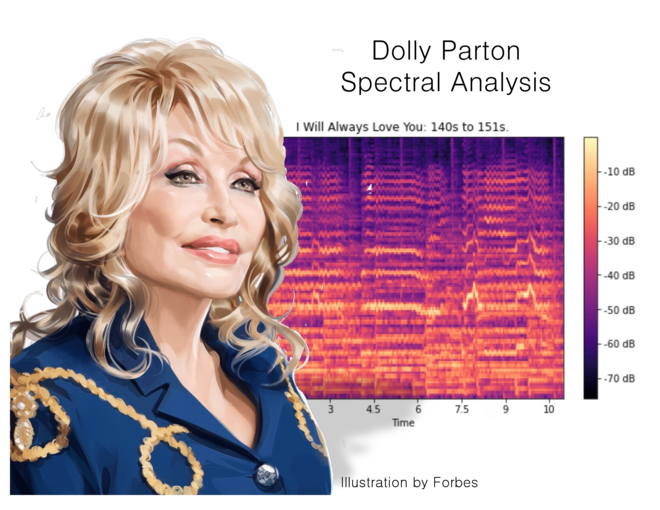Spectrolene is code originally intended for spectral analysis on a selection of Dolly Parton's music from her "Jolene" album. However, this code can be used on any music for audio analysis as long as the file type is a mono .wav.
Check out my latest presentation on my analyis!
The data cannot be shared because of copyright, but it is important to pay attention to the audio files you use to run your analyses.
This code is only compatible with .wav mono files.
You can follow this tutorial provided by Apple to download your music as a .wav
In order to convert from stereo to mono, you can use sox.
First, open a terminal on Mac or on Windows
Run the sox installation:
- Using Homebrew on Mac:
brew install sox - or Linux
brew install sox - or Python Package Index
pip install sox
Average the channels in the stereo (credit: linuxquestions.org)
sox filename.wav -c 1 filename_mono.wav
This can also be done in the data directory by running:
./2mono.sh file_name
Of course, this is not the only way. If you have a working way of converting stereo to mono, feel free to share, so we can help other users.
You can install the latest Python here
You can open a terminal on Mac or on Windows
In terminal, install the following dependencies (or make sure they are installed):
pip install numpy
pip install matplotlib
pip install scipy
pip install librosa
After downloading the files, you can run:
jupyter notebook
in terminal to open up a file navigation system with an integrated development environment (IDE) to handle the files.
For the functions in the code to work without any modification to the code, add them to a folder named data that is located in the same directory as the .ipynb files.
For any troubleshooting, ideas, or suggestions:
Joesph Beller
[email protected]
[email protected]
A lot of help was provided by the Python, music, and audio communities:
- Top 3 Python packages to learn audio data science
- Learning from audio: the mel scale and mel spectrogram and mel frequency cepstral coefficients
- Malawey, Victoria. A Blaze of Light in Every Word : Analyzing the Popular Singing Voice. New York, NY: Oxford University Press, 2020. Print.
